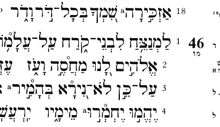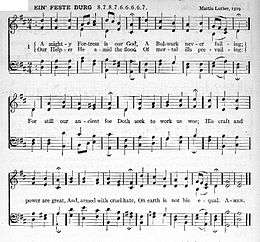Psalm 46


Psalm 46 is the 46th psalm from the Book of Psalms,[1][2][3][4][5] composed by sons of Korah.
The psalm is credited to the sons of Korah mentioned in 2 Chronicles 20:19. In the introductory statement the tune is said to be based on "after the manner of virgins" but there has been some debate about whether this is the name of a familiar tune or falsetto in a higher octave. [6]
Structure
The Psalm is composed of four parts:
- Verse 1: Designation of the sons of Korah as authors and reference to the manner of performance
- Verse 2-4: Confession of trust of the community, even if the creation were sinking into chaos
- Verse 5-8: View of the undisturbed security of the city of God, which can not be shaken by the attack from outside
- Verse 9-12: Looking back on the victory of God and on his peacemaking power.
In verses 8 and 12, a chorus is repeated. This chorus was originally probably between verses 4 and 5, but might have been removed because of a copyist's mistake.[7]
Interpretation
The River
There is a question as to what "river" the psalm is referring to in verse 5 whose streams, according to the King James Version of the Christian Scriptures, makes glad the city of God. Several possibilities have been advanced.
The Jordan River
It is possible to identify this river in Psalm 46 as the Jordan River. However, the Jordan River is a distance of 20 miles northeast of Jerusalem (assuming that the "city of God" is a reference to Jerusalem). For this reason, some have found this possibility unlikely.[8]
A River in Jerusalem During the Millennial Reign of Christ
It's possible to match this river to the description of the river which will run from beneath the Jewish Temple eastward to the Dead Sea as described in the forty-seventh chapter of the Old Testament book of the prophet Ezekiel.[8]
A River in Jerusalem After the Millennial Reign of Christ
Another possibility is that this river is to be identified with the river that flows from the New Jerusalem as described in the twenty-second chapter of the New Testament Book of Revelation.
The City of God
The city of God mentioned in Psalm 46:5 is likely Jerusalem.[8]
Setting of the Psalm
It's been proposed that this psalm is prophesying a time when, according to Christian Scripture, Jesus Christ returns to rule the world from Jerusalem for 1,000 years.[8]
Uses
Judaism
Portions of the psalm are used or referenced in several Jewish prayers. Verse 8 is the ninth verse of V'hu Rachum in Pesukei Dezimra,[9] and is also a part of Uva Letzion.[10] Verse 12 is part of Havdalah.[11][12] Yemenite Jews include it as part of Yehi Kivod.[13]
Catholic
This psalm was traditionally recited or sung at the office of matins mardi[14] after St. Benedict of Nursia established his rule of St. Benedict around 530, mainly in numerical order of psaumes[15]
Today, Psalm 46 is sung or recited at Vespers on Friday the first semaine.[16]
Politics
Barack Obama has referenced the psalm in several speeches, most notably the Tucson memorial speech and his speech on the 10th anniversary of 9/11.
Music

Martin Luther wrote and composed a hymn which paraphrases Psalm 46, called "A Mighty Fortress Is Our God".
A cantata by Johann Sebastian Bach is based on Luther's hymn, and Ludwig Hailmann wrote the Reformation era song "Praise God, ye pious Christians, rejoice with David, the psalmist".[17] In the 17th century, the composer Johann Pachelbel wrote a motet from Psalm 46 called Gott ist unser Zuversicht und Stärke, and in 1699, Michel-Richard Delalande also composed his grand motet based on the Psalm. French composer Jean Philippe Rameau also used the Psalm for the motet Deus noster refugium.
In contemporary music, the Christian duo Shane & Shane adapted the Psalm into the song "Psalm 46 (Lord of Hosts)," which appeared on their 2016 album Psalms II.
Shakespeare's alleged involvement
For several decades, some theorists have suggested William Shakespeare placed his mark on the translated text of Psalm 46 that appears in the King James Bible, although many scholars view this as unlikely, stating that the translations were probably agreed upon by a committee of scholars. [18]
On the other hand, Shakespeare was in King James' service during the preparation of the King James Bible, and was generally considered to be 46 years old in 1611 when the translation was completed. There are a few extant examples of Shakespeare's actual signature, and as was customary at the time, with spelling being somewhat lax in those pre-standardized days, on at least one occasion he signed it 'Shakspeare', which divides into four and six letters, thus '46'. The 46th word from the beginning of Psalm 46 is "Shake" and the 46th word from the end (omitting the liturgical mark "Selah") is "Spear" ("speare" in the original spelling). Any professional writer, however, who has ever dealt with an editor or in this case, 'a committee of scholars' would realize that had Shakespeare indeed excised the spurious word 'Selah' so that the word count would reveal the word 'Spear', there would have been no redress had the committee reversed the decision and put 'Selah' back in place.
References
- ↑ Commentaires sur les psaumes, d’Hilaire de Poitiers, (Paris, Éditions du Cerf, 2008), collection sources chrétiennes n°515,
- ↑ Commentaries of the Psalms, by saint John Chrysostom
- ↑ Discourse of the Psalmes, by Saint Augustin, vol. 2 (Sagesses chrétiennes)
- ↑ Commentary (jusqu’au psaume 54), by saint Thomas Aquinas, (Éditions du Cerf, 1273)
- ↑ John Calvin, Commentaries des psalms, 1557
- ↑ Stuttgarter Erklärungsbibel. Deutsche Bibelgesellschaft Stuttgart,(1992) p. 699f.
- ↑ Die Bibel mit Erklärungen. ISBN 3-7461-0069-0, 3. (Evangelische Haupt-Bibelgesellschaft, Berlin 1993).
- 1 2 3 4 "Psalm 46 Meaning". Explaining the Book. 2018-02-15. Retrieved 2018-02-26.
- ↑ The Complete Artscroll Siddur page 63
- ↑ The Complete Artscroll Siddur page 157
- ↑ The Complete Artscroll Siddur page 619
- ↑ D’après le Complete Artscroll Siddur, compilation des prières juives.
- ↑ Jewish liturgy and its development By Abraham Zebi Idelsohn, page 82
- ↑ Psautier latin-français du bréviaire monastique, (2003) p. 189.
- ↑ Prosper Guéranger, Règle de saint Benoît, (Abbaye Saint-Pierre de Solesmes, 2007). p46
- ↑ Le cycle principal des prières liturgiques se déroule sur quatre semaines.
- ↑ Rudolf Köhler, Handbuch zum Evangelischen Kirchengesangbuch vol II. (Die biblischen Quellen der Lieder, Berlin 1964), p. 325f.
- ↑ Susan Gillingham (2012). Psalms Through The Centuries. John Wiley & Sons. p. 238. ISBN 978-0470674901.
External links
